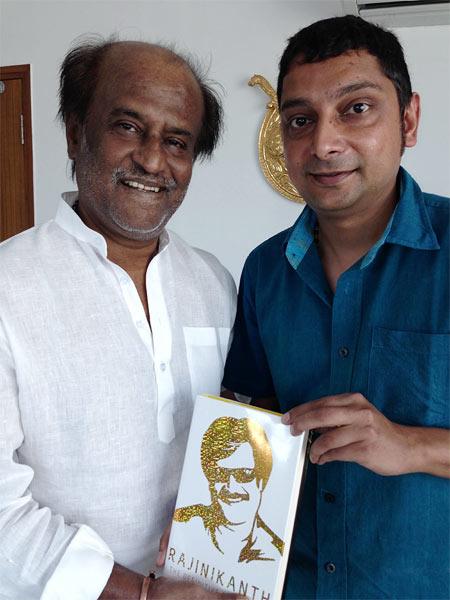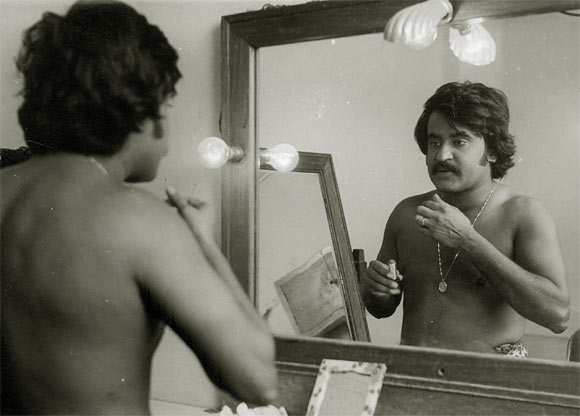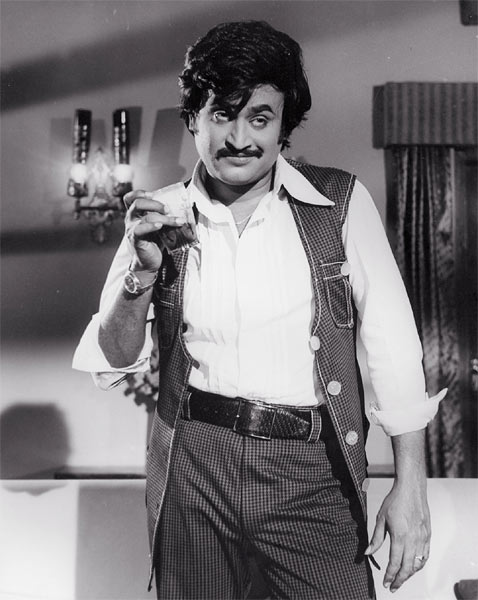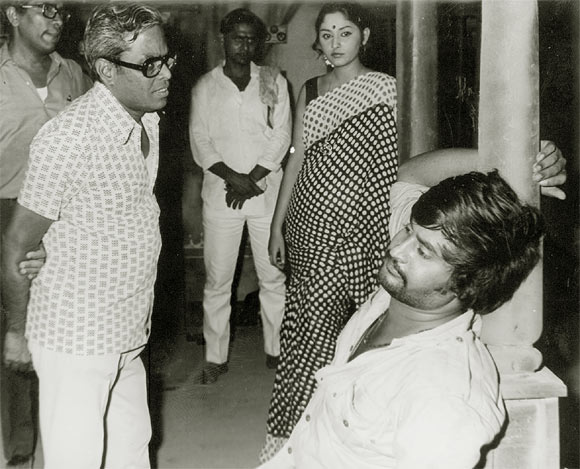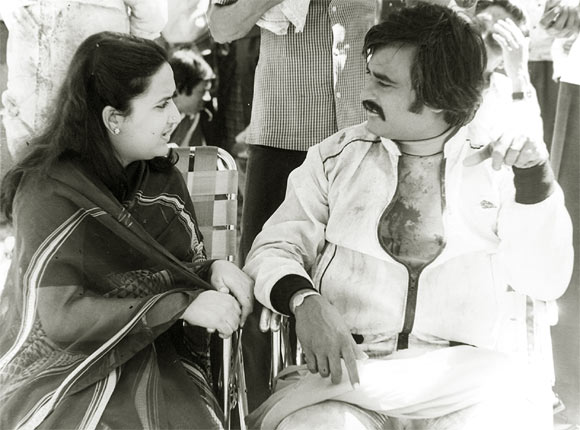 | « Back to article | Print this article |
'I've not met a star as simple as Rajinikanth'
Naman Ramachandran is steeped in the world of cinema being writer, film critic and film consultant.
A trustee of the Satyajit Ray Foundation, London, and a founder-member of the London Indian Film Festival, Naman is also a voting member of BAFTA (British Academy of Film and Television Arts).
He is the author of Rajinikanth, A Definitive Biography, which was released in December.
Although based in London, Naman is right now touring India as the book is being launched in different cities of the country. The book was recently released in Hyderabad. Radhika Rajamani gets Naman Ramachandran talking about the book:
You are a writer, film critic, and film consultant for film festivals. How did you get interested in films?
It's all thanks to my mother. When I was a small boy growing up in Alleppey, Kerala, my mother took me to watch Satyajit Ray's Ashani Sanket. It was a rare occasion when a Bengali film (my mother is Bengali) released in our small town.
Though I was too young to fully appreciate the film at the time, the power of the medium hooked me and thereafter I would watch everything that released – especially films of Rajini, Kamal, Amitabh and Jayan.
The interest only grew after we moved to Bangalore. After I graduated from my journalism masters programme, it was only natural that I chose a career in writing about films and celebrating cinema.
'I wanted to document Rajinikanth's life and career in an engaging manner'
Whatare you currently up to and how do you juggle all your activities?
I'm a film critic for South Asian cinema for Sight & Sound, look after South Asia for Variety, and the UK and Ireland film markets for Cineuropa.
Besides these I'm a trustee of the Satyajit Ray Foundation, London, and a founder-member of the London Indian Film Festival. In addition I'm a consultant for several other festivals and also on Indo-UK film projects. I'm also a voting member of BAFTA. And I write books...
All of these may seem like a lot, but with efficient time management and proper structuring of the work day, it's possible. It just needs a lot of self-discipline. Having said that, sometimes, sleep is a casualty.
What made you want to write a biography of Rajinikanth?
The main reason for writing the book was the lack of any authoritative published information on such an important figure of Indian cinema. I also wanted to document his life and career in an engaging manner.
Why did you not interview him? Is it because he did not want to give any interview?
I could not interview him because he was ill at the time and was under medical orders not to meet anyone. However, he did give me written permission to write the book.
I managed to meet him briefly and talk to him in London while he was shooting Kochadaiyaan.
Perhaps not being able to interview him properly was a blessing in disguise as I was able to be completely objective.
'Rajinikanth appreciated the depth of research that went into to the book'
What was his reaction to the book?
He was absolutely delighted with the book and appreciated the depth of research that went into it.
How was Rajinikanth to interact with?
He was an absolute delight to meet whenever I met him. He was well-spoken and charming and was the soul of humility.
After the book was published, a copy was sent to him. I happened to be in Bangalore when my phone rang. It was an unfamiliar number. When I answered, his very familiar voice asked me where I was. And he asked me to return to Chennai post-haste. When I met him in Chennai, he couldn't stop raving about the book. Of all the praise I've received for the book, his meant the most!
What are your observations of the superstar?
Simplicity. That's my one single biggest observation about the superstar. I've not met any star as simple as him.
He also comes across as extremely honest and caring. When I met him, he was extremely solicitous and had a genuine interest for my well-being. It is rare to meet somebody as genuine as him, not just from the film industry, but from any walk of life.
In a way, I'm glad that I got to meet him properly only after I finished the book, as I was able to be completely objective and honest about his life and career and the writing is not swayed by my renewed affection for him.
'People connect to Rajinikanth because of his tremendous God-given charisma'
In the course of meeting people who spoke about Rajinikanth, they must have mentioned all his positive traits. Did anyone talk about any of his negative traits or weaknesses?
His elder brother Satyanarayana does talk about some of these, which have been reproduced in the book. It mainly relates to concern stemming from the smoking and drinking that led to his ill-health. But Satyanarayana also says that these practices are all too normal in the film industry.
Rajinikanth's popularity spans across southern India and parts of South-East Asia. What would you attribute it to?
I think it's because of his extreme simplicity and humility and him being a man both on and off-screen that the average person on the street can connect with instantly. People get the feeling he's one of their own. Beyond that it is his tremendous God-given charisma.
Even now people wait for his films though there is a time gap between them...
Because there is a time gap between his films, there is an enormous sense of anticipation that arises amongst his fans. And hence each new release becomes a massive event – a classic case of less being more in his case.
'I'm a journalist first and than a fan of Rajinikanth'
It's interesting you call it a definitive biography. Is it because you have spoken to all those near and dear to him?
It's called a definitive biography simply because it is comprehensive in the depth and breadth of information provided. And yes, I've interviewed a large selection of people associated with him. I've also deconstructed some of his more important films in some depth.
Didn't being a fan hinder you from adopting.... a neutral, dispassionate perspective on Rajinikanth, his work and milieu?
I'm a journalist first and a fan later. It was very important to me to be objective. Otherwise, the biography would have descended into a hagiography. That's why I have not hesitated to criticise some of his more questionable career choices.
What is the methodology you adopted while writing the book? How long did this book take?
I spent several months in South India and Mumbai interviewing people and collecting information. I also collected DVDs of all the 154 films that he has worked in.
Then I went back to London, locked myself up and watched each film twice, once wearing a lay viewer's hat and another time wearing a critic's hat, all the while taking notes.
The last part of the research was done at the British Library. After that I went into a trance and spent six months writing and polishing the book.
The overall process took around two years. It was gruelling indeed, but the process was ultimately rewarding.
What are you taking up next?
It will be a book on Indian cinema. That's all I know for now.
